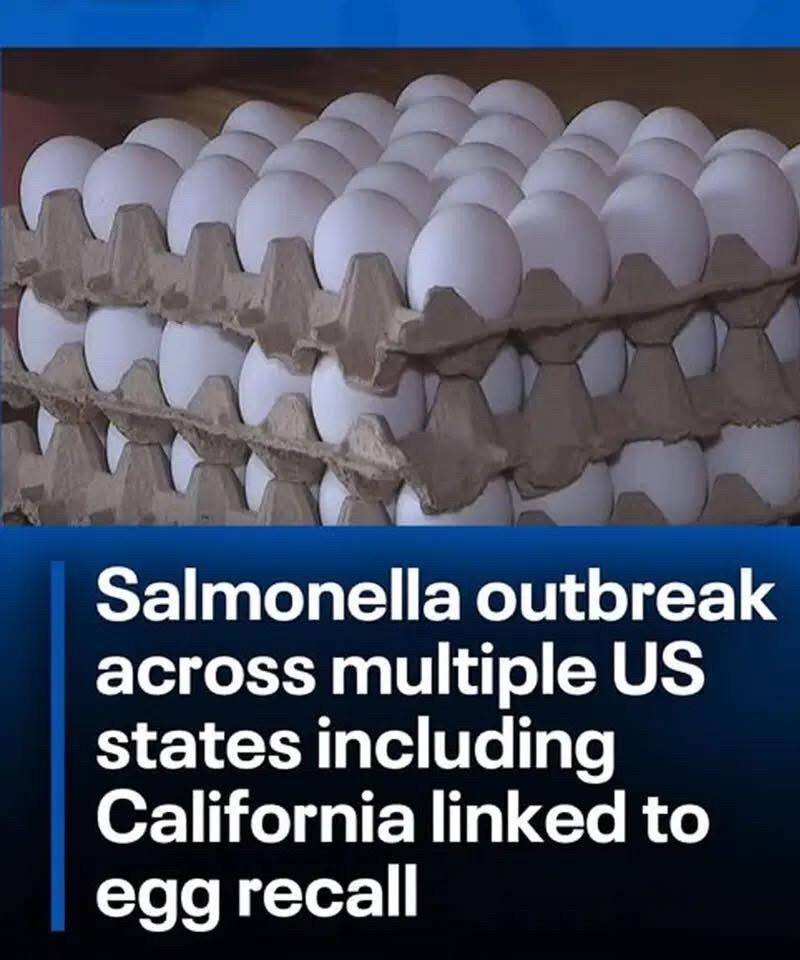Federal health officials are sounding the alarm over a growing multistate salmonella outbreak linked to recalled eggs that has already left nearly 100 people sick, with more cases expected as testing and tracking continue. According to the Centers for Disease Control and Prevention, 95 illnesses have been confirmed so far, but because salmonella symptoms can take time to appear and not all cases are immediately reported, the real number of people affected may be higher.

The outbreak spans multiple states, underscoring serious concerns about food safety, supply chain practices, and how quickly contaminated products can spread across the country. Investigators traced the contaminated eggs back to Country Eggs, LLC, which produced the recalled batches. These eggs were distributed in cartons labeled as Large Brown Cage Free Sunshine Yolks, a name that might not immediately raise suspicion for consumers trying to identify recalled products. The problem was made worse when officials discovered the same eggs had been repackaged and sold under different brand names, including Nagatoshi Produce, Misuho, and Nijiya Markets.
This repackaging complicates matters significantly because consumers may not realize the eggs in their refrigerator are part of the recall if they only check the brand printed on the carton. The CDC and the Food and Drug Administration have urged all consumers to carefully check egg cartons in their homes and to immediately discard or return any products from the affected brands. For anyone uncertain about their purchase, the safest option is to throw the eggs away. Officials also emphasized the importance of sanitizing any surface, utensil, or container that came into contact with the recalled eggs, since salmonella bacteria can spread easily and survive on kitchen surfaces if not cleaned properly.
Salmonella infection, commonly known as salmonellosis, typically causes diarrhea, fever, stomach cramps, nausea, and vomiting. Symptoms generally begin between six hours and six days after infection and may last up to a week. Most otherwise healthy adults recover without medical intervention, but for vulnerable groups such as infants, older adults, and individuals with weakened immune systems, the illness can escalate quickly and may even become life-threatening. Hospitalizations are not uncommon in severe cases, particularly when dehydration from prolonged diarrhea sets in.
Health officials are urging people experiencing severe or persistent symptoms after consuming eggs to seek medical care immediately. While the recall is underway, the CDC and FDA are also reminding the public of basic food safety practices that can help prevent salmonella and other foodborne illnesses. These include always cooking eggs until both the yolk and white are firm, avoiding dishes that contain raw or undercooked eggs such as homemade mayonnaise, cookie dough, or certain sauces, and washing hands, utensils, and countertops thoroughly after handling eggs.
Keeping eggs refrigerated until they are ready to be cooked is also an important step in reducing the risk of bacterial growth. Food safety experts have noted that the repackaging and distribution of the contaminated eggs highlight a recurring vulnerability in the U.S. food supply chain, where products from a single source can end up on grocery shelves under different names across multiple states. This makes swift recalls more complicated and increases the likelihood of exposure before consumers become aware of the risk.
The ongoing investigation will continue to track how far the contaminated eggs were distributed and whether additional illnesses are connected to the outbreak. Officials say quick consumer action is essential to containing the spread of illness, since every day recalled products remain in circulation increases the chance of more people getting sick. Although the eggs linked to this outbreak are being pulled from shelves, consumers are encouraged to remain vigilant in checking their refrigerators and not to assume that unfamiliar brand names are safe. The CDC continues to update its website with the latest case counts and brand information, while the FDA is working with distributors and retailers to ensure recalled products are removed from circulation.
For now, the best protection comes from awareness and strict food safety practices. This outbreak is yet another reminder that foodborne illnesses remain a serious public health challenge, and even a common grocery staple like eggs can pose significant risks if contamination occurs. By discarding potentially unsafe products, cleaning thoroughly, and practicing safe cooking habits, consumers can play a crucial role in preventing further illness. Federal health agencies emphasize that staying alert and informed is the most effective way to protect yourself and your family as the investigation continues and more details come to light.





